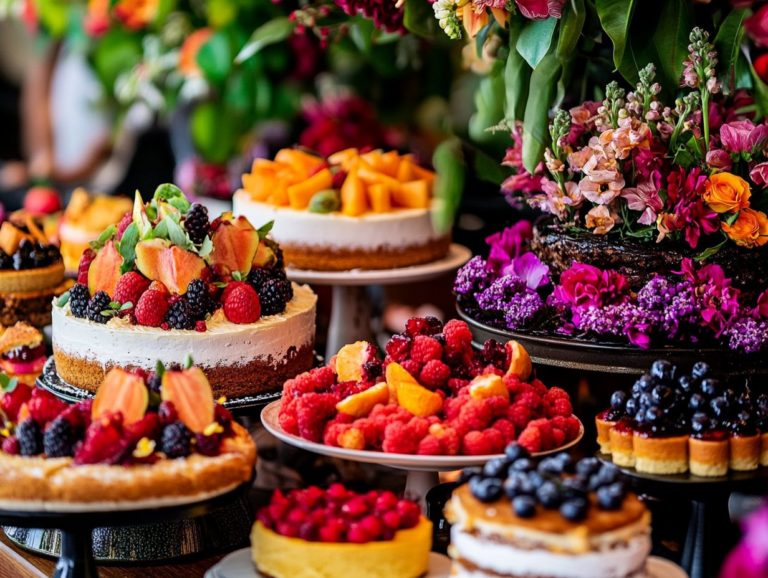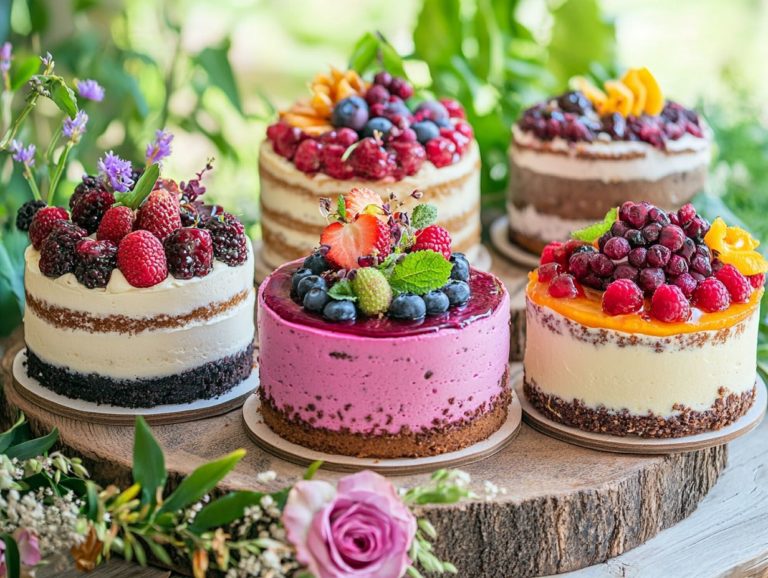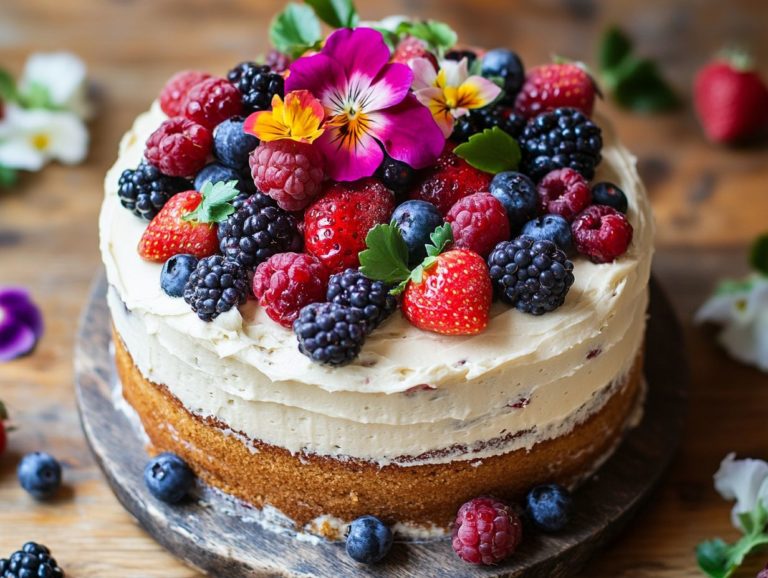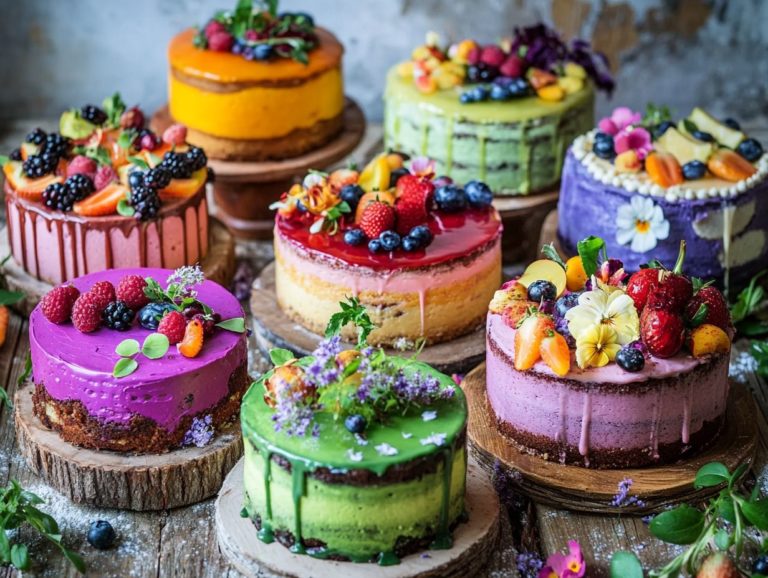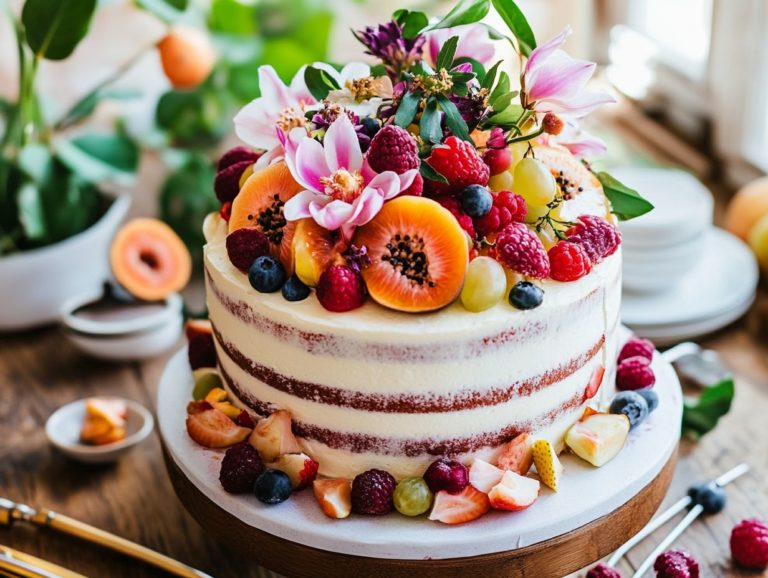Vegan Cake Ingredients: What to Use?
Baking a delectable vegan cake is more attainable than you may realize, and it begins with selecting the perfect ingredients for your recipe inspired by your favorite cakes.
Consider the essential staples that make vegan cakes just as delightful as their traditional versions, from non-dairy milk to vegan butter and aquafaba. These alternative ingredients not only introduce unique flavors and textures but also come with invaluable vegan baking tips to guarantee your cake emerges flawlessly every time.
Prepare to dazzle others with your impressive baking prowess and delicious vegan recipes! Get ready to impress your friends and family with your vegan baking skills!
Contents
- What Are Some Common Ingredients Used In Vegan Cakes?
- Essential Ingredients for Vegan Baking
- Alternative Ingredients for Vegan Cakes
- What Are Some Tips for Baking Vegan Cakes?
- 3. Use Room Temperature Ingredients
- 4. Add Extra Moisture
- 5. Adjust Baking Time and Temperature
- Frequently Asked Questions
- What are some common ingredients used in vegan cake recipes?
- Can I substitute regular flour for a vegan flour in a cake recipe?
- Are there any vegan alternatives to eggs in a cake recipe?
- What are some natural sweeteners that can be used in vegan cakes?
- Can I use plant-based milk in a cake recipe instead of regular milk?
- Are there any vegan alternatives to butter in a cake recipe?
Key Takeaways:
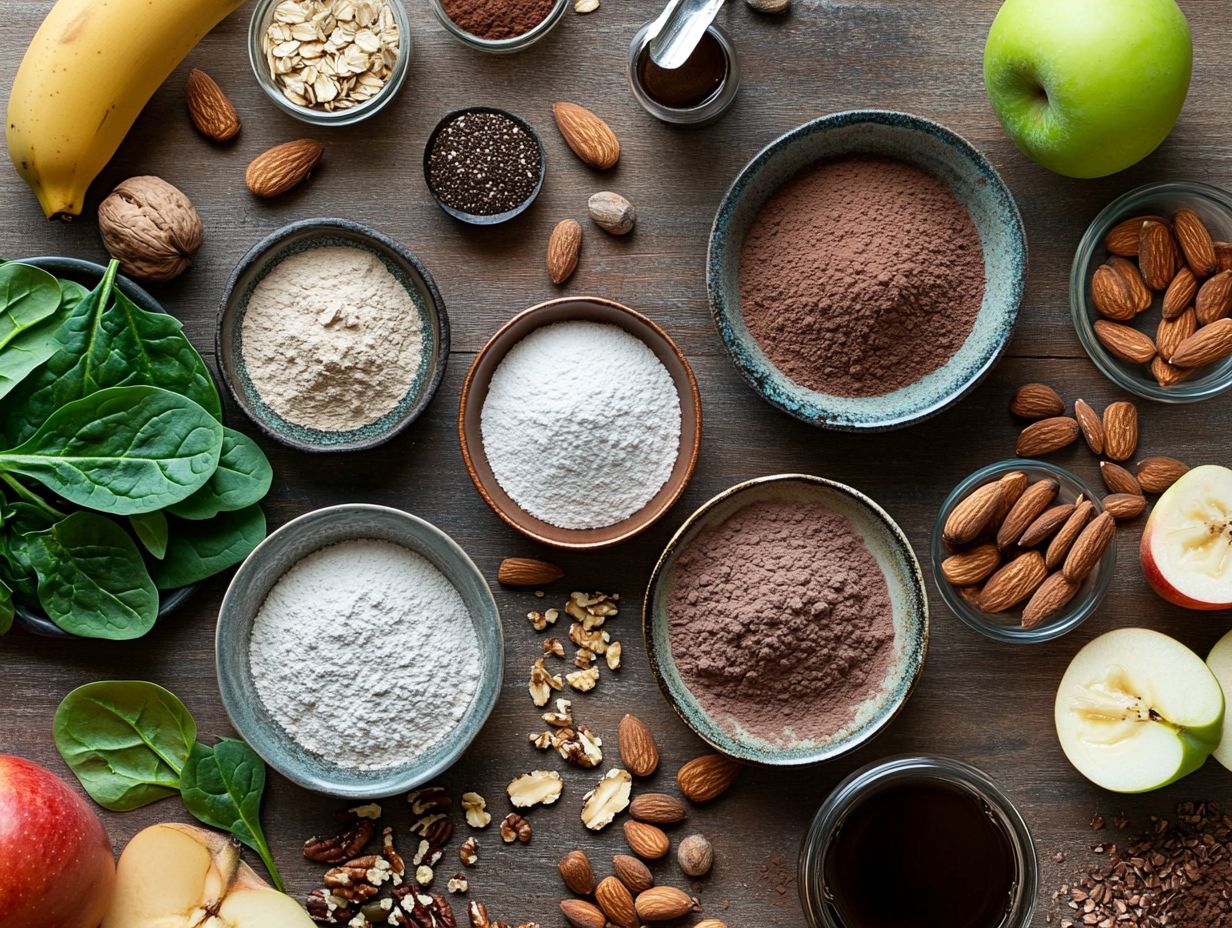
- Choose dairy-free alternatives like non-dairy milk, vegan butter, and flaxseed or chia eggs for a delicious vegan cake.
- Get creative with alternative ingredients such as applesauce, avocado, and tofu to add unique flavors and textures to your vegan cake.
- Follow these tips for the perfect vegan cake: use non-stick pans, preheat your oven, use room temperature ingredients, add extra moisture, and adjust baking time and temperature.
- Try making a 1 bowl cake for a quick easy recipe that saves time on cleanup!
What Are Some Common Ingredients Used In Vegan Cakes?
As you delve into the realm of vegan baking, grasping the common ingredients used in vegan cakes is crucial for creating delightful and moist treats. Whether you re whipping up a rich vegan chocolate cake or a light vegan vanilla cake, the right ingredient combinations can yield results that are both delicious and accommodating to various dietary needs.
Opt for non-dairy milk alternatives like almond milk or coconut milk to replace traditional dairy. Vegan butter provides the essential fat needed to achieve a rich flavor profile. By incorporating ingredients such as flaxseed or chia seeds as egg substitutes, alongside sweeteners like agave nectar or maple syrup, you can significantly enhance your easy vegan desserts.
Mastering a chocolate buttercream frosting using vegan alternatives can transform your cake into an indulgent masterpiece, perfect for any birthday celebration.
For chocolate cake lovers, consider trying a vegan chocolate cake recipe for a delicious and moist vegan cake that everyone will enjoy!
1. Non-Dairy Milk
Non-dairy milk, like almond and coconut milk, has become an essential player in your vegan baking repertoire, stepping in to replace traditional dairy milk with finesse.
These alternatives bring a delightful array of flavors and textures that elevate the overall quality of your vegan cakes. For example, when you use oat milk, you ll enjoy a creamy richness that closely mimics the texture of whole milk. Meanwhile, soy milk adds a protein boost, resulting in a denser crumb. Cashew milk, with its subtle nuttiness, works wonders in complementing rich chocolate or spice cakes. Each option not only caters to diverse dietary preferences but also offers unique nutritional advantages.
As you choose the right non-dairy milk for your baking adventures, opting for unsweetened varieties is typically your best bet to maintain the ideal sweetness of your final product. By incorporating these milks, you can elevate the moisture levels and enhance the cake’s structure, ensuring a delightful texture in every bite. Using them is also a great way to make family-friendly recipes that everyone can enjoy!
2. Vegan Butter
Vegan butter options, like Earth Balance, are essential for achieving the rich flavor and moist texture that your vegan cakes need. These alternatives do more than just replace traditional dairy butter; they introduce a unique taste profile that enhances the overall flavor of your baked goods.
When you compare vegan butter to its dairy counterpart, keep in mind that many varieties are crafted from blends of oils, offering a similar creamy texture and mouthfeel. For the best baking results, you should select vegan butter with a higher fat content, as this will help maintain the cake’s integrity and prevent it from drying out. Incorporating it into your recipes becomes a breeze with a gentle melting or softening beforehand.
This little step can elevate its ability to blend seamlessly with other ingredients, resulting in a cake that s not only delicious but also visually stunning.
Don’t miss out on these essential tips! Try these tips today and share your delicious vegan creations with us!
Essential Ingredients for Vegan Baking
3. Flaxseed or Chia Eggs
Flaxseed and chia eggs are your go-to binding agents for vegan cakes. They deliver the essential structure and moisture that eggs usually provide.
To create a flaxseed egg, simply combine one tablespoon of ground flaxseed with two and a half tablespoons of water. Allow it to rest for about 10 to 15 minutes until it transforms into a gel-like consistency.
For chia eggs, the process is just as straightforward: mix one tablespoon of chia seeds with three tablespoons of water and let it sit for a similar duration.
These plant-based alternatives do more than just add moisture. They offer a nutritional boost, bringing omega-3 fatty acids and fiber into the mix.
When you incorporate flaxseed and chia eggs into your dessert recipes, you ensure that your vegan cakes remain delightfully moist with a satisfying texture. This means your homemade treats will impress both vegans and non-vegans alike!
Using these ingredients creates a healthy vegan dessert that is both nutritious and delicious.
4. Agave Nectar or Maple Syrup
Agave nectar and maple syrup are standout sweeteners in the realm of vegan baking. They offer not only natural sweetness but also a delightful enhancement to the overall flavor profile of your cakes.
Yet, their unique characteristics distinguish them in both taste and nutritional value. Agave nectar, extracted from the agave plant, presents a mild flavor that elegantly complements other ingredients without stealing the spotlight.
In contrast, maple syrup, derived from the sap of sugar maple trees, delivers a bold, caramel-like essence that can dramatically shape the flavor of your baked creations.
Regarding sweetness, agave nectar takes the lead, being sweeter than maple syrup. This can be advantageous when you’re considering substitutions in your recipes.
To create the right level of sweetness in your vegan cakes, don t hesitate to experiment by blending these sweeteners with fruits or alternative sweeteners, enhancing flavors while maintaining a harmonious palate!
5. Aquafaba
Aquafaba, the liquid from canned chickpeas, is a great alternative in the world of vegan baking. It serves as an exceptional egg substitute that can be whipped to create wonderfully fluffy textures in cakes and frostings.
Its remarkable properties allow it to mimic the functionality of eggs, making it a critical ingredient for anyone venturing into vegan baking. Using aquafaba achieves light and airy results that elevate the overall quality of your desserts.
To whip aquafaba effectively, ensure it s at room temperature and use a clean bowl and whisk; any lingering fat residues can sabotage your whipping efforts.
Once you ve whipped it to perfection, it effortlessly incorporates air into cake batters, resulting in a delicate crumb that will impress. It also serves as an ideal base for a luxurious vegan chocolate frosting that delivers creamy richness without the dairy!
6. Coconut Oil
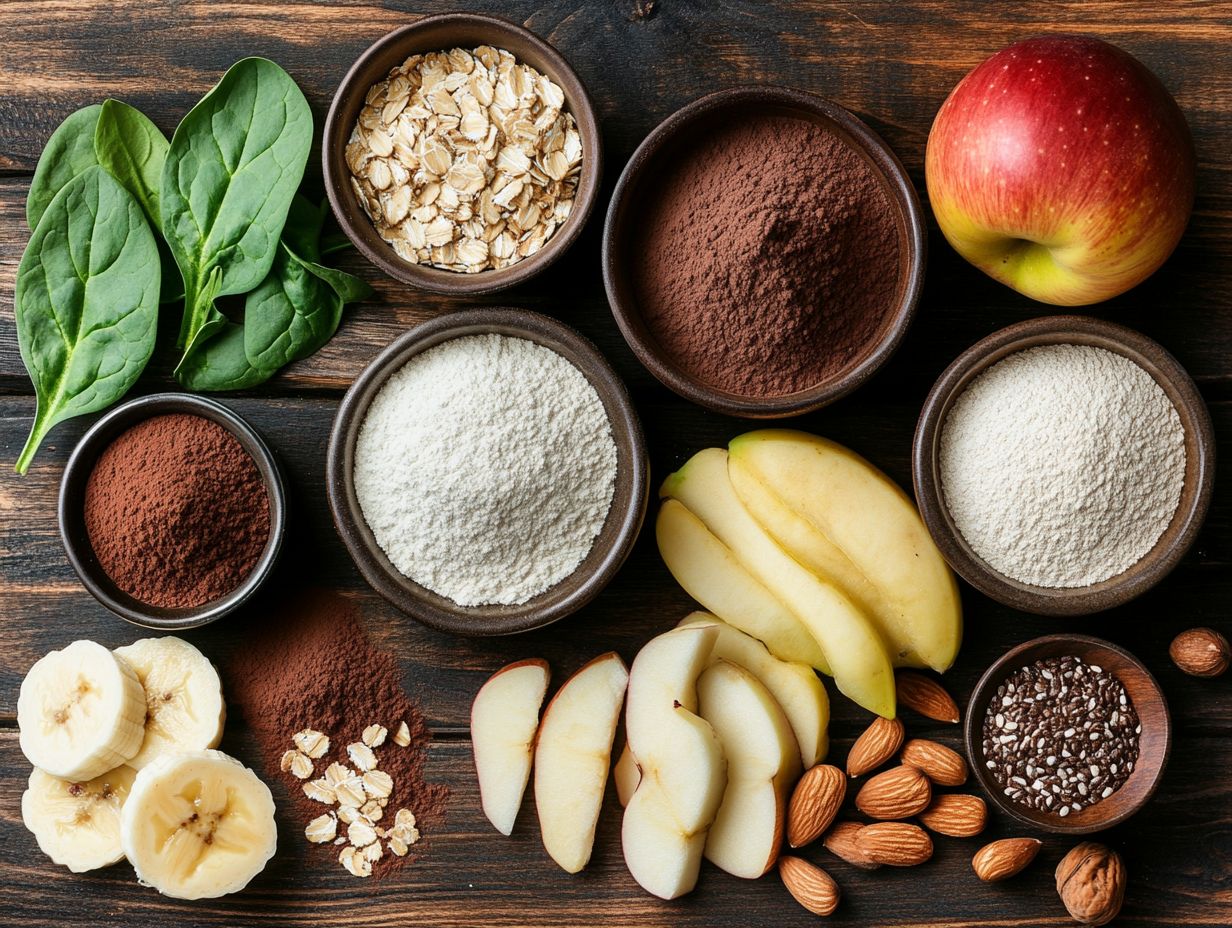
Coconut oil stands out as a versatile fat used for baking that adds moisture and richness into vegan cakes. It is a favored choice among those who bake without animal products.
You ll find it available in both refined and unrefined forms, each offering unique properties that can elevate your recipes. Unrefined coconut oil retains a gentle coconut flavor and aroma, adding a delightful tropical twist to your cakes.
Refined versions provide a neutral taste that lets other flavors take center stage.
For optimal results, it s wise to melt the oil before incorporating it, ensuring it blends effortlessly with the other ingredients.
By swapping out butter or other oils for coconut oil, you can achieve a wonderfully delightful texture resulting in moist crumbs and a tender bite while also infusing your treats with healthier fats!
Try using these ingredients in your next baking adventure!
7. Almond Flour
Almond flour stands out as a premium gluten-free alternative to traditional flours, adding a delicious nutty flavor to your vegan cakes and providing extra moisture.
This remarkable flour, crafted from finely ground almonds, not only elevates the taste profile of your baked goods but also enriches them with healthy fats and fiber.
When you compare almond flour to all-purpose flour, you’ll notice that almond flour boasts a denser texture, which can result in richer cakes and pastries. If you love baking, it’s essential to remember that almond flour demands precise measuring techniques; its density can significantly impact the final outcome of your recipes.
Incorporating almond flour thoughtfully often in combination with other gluten-free flours can help achieve that light and fluffy texture cherished in vegan baking.
Alternative Ingredients for Vegan Cakes
In the world of vegan baking, you can transform your cakes with alternative ingredients that enhance flavor and offer remarkable health benefits.
Consider incorporating options like applesauce, avocado, and nut butters. These fantastic substitutes can elevate your recipes, making your creations both delicious and nourishing.
1. Applesauce
Applesauce stands out as a favored egg replacement in vegan baking, skillfully adding both moisture and a touch of natural sweetness to your cakes. It is especially useful in recipes that require boiling water cake techniques to ensure even moisture distribution throughout the batter.
When you decide to use applesauce as a substitute, the general guideline is to replace each egg with a quarter cup of unsweetened applesauce. This boosts the cake s moisture content and infuses a subtle, fruity flavor.
As a result, you’ll find that the texture remains irresistibly soft and tender, making it an excellent choice for lighter cakes or quick breads. The natural sweetness of applesauce often permits a reduction in added sugars, creating a healthier dessert option without compromising on flavor.
Applesauce is an exciting and versatile ingredient that every vegan baker should love!
2. Avocado
Avocado is a nutrient-dense alternative that elevates your vegan cakes by adding healthy fat and moisture, ultimately enhancing their overall texture. This creamy fruit not only helps create a rich and indulgent flavor profile but also acts as a beneficial substitute for traditional fats like butter or oil.
When you decide to incorporate avocado into your cake recipes, begin by mashing or pureeing the fruit until it reaches a smooth consistency. This ensures an even distribution throughout the batter, intensifying moisture and contributing to a tender crumb.
For the best results in vegan baking, consider adjusting the sweetness of your recipe, as avocados offer a subtle richness that beautifully balances flavors. A hint of vanilla or a splash of citrus zest can further elevate the taste, making each bite not just delightful but truly satisfying.
3. Tofu
Silken tofu (a softer type of tofu), with its remarkable versatility, can be your go-to protein-packed alternative in vegan cakes, lending a creamy texture and moisture that you ll love.
By incorporating this ingredient, you can achieve a delicate crumb and a mouthfeel that competes with even the finest traditional cakes. When blended to perfection, silken tofu binds the ingredients beautifully while adding a nutritional boost, making your desserts not only delicious but also more satisfying.
If you’re venturing into vegan baking, think about integrating tofu into recipes like chocolate mousse cake or blueberry muffins. This simple addition can elevate the flavor profile without compromising your dietary choices. Just pur e the tofu until it s creamy and swap out a portion of the fat or eggs in your recipe, ensuring a delightful, healthier treat that everyone will appreciate.
Try these alternatives in your next baking session and enjoy the delicious transformation they bring!
4. Nut Butters
Nut butters, like almond or peanut butter, infuse your vegan cakes with rich flavor. They also offer healthy fats and moisture.
When you incorporate them into your baking, they become a delightful base that enhances both texture and taste. For example, almond butter adds a subtle sweetness and creamy consistency, while peanut butter lends a robust earthiness that pairs beautifully with chocolate or banana flavors. The velvety texture of these spreads can transform your cakes into denser, richer creations, offering a truly satisfying mouthfeel.
Dive into the deliciousness of nut butters now! Try recipes such as a moist chocolate peanut butter cake or a delightful almond butter banana bread. Both options highlight the unique characteristics of nut butters, elevating your vegan baking experience to an entirely new level of deliciousness.
5. Dates
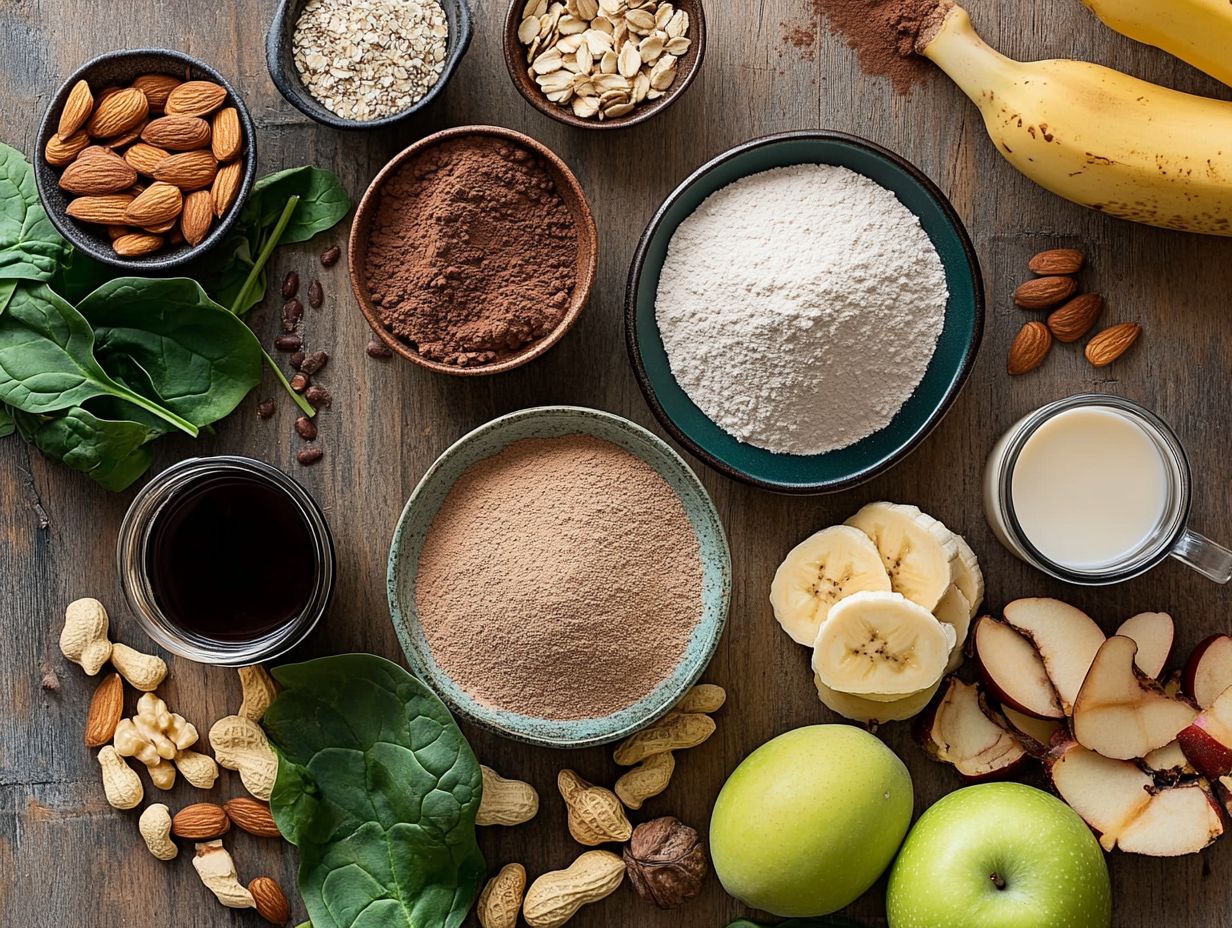
Dates serve as a remarkable natural sweetener, perfect for elevating the sweetness of your vegan cakes while also packing in essential nutrients and fiber.
By incorporating dates into your cake recipes, you re not just enhancing the flavor profile; you re also adding a delightful depth of texture that transforms the entire indulgence. When working with dates, it’s crucial to prepare them properly soaking or blending them into a puree allows for seamless incorporation into the batter. The natural sugars found in dates contribute a lovely sweetness, but it’s crucial to balance this with your other ingredients to prevent the cake from becoming overly sweet.
A savvy tip for achieving the perfect sweetness is to start with a smaller amount of dates. Gradually add more while tasting along the way, ensuring that the final product meets your desired sweetness without compromising on taste or texture.
What Are Some Tips for Baking Vegan Cakes?
Baking vegan cakes is an exciting adventure waiting for you! Embrace a few essential tips, such as using non-stick pans, preheating your oven properly, and ensuring your ingredients are at room temperature to enhance the outcome of your delightful vegan creations.
1. Use Non-Stick Pans
Using non-stick pans is essential for ensuring that your vegan cakes release effortlessly, transforming the baking experience into a seamless and enjoyable endeavor.
Using these superior pans offers several advantages. They create an evenly heated baking environment, allowing the ingredients to work together well for a consistent texture and flavor throughout. This aspect is particularly vital in vegan baking, where the absence of eggs can sometimes lead to unpredictable outcomes.
When choosing the right non-stick pan, consider options like silicone or ceramic-coated varieties. These choices are eco-friendly and excel at delivering a flawless release without requiring excessive oils. By opting for these materials, you help preserve the integrity of your delicate desserts, ensuring that each delightful bite is as satisfying as the last.
2. Preheat Your Oven
Preheating your oven before baking is an essential step that ensures your vegan cakes rise beautifully and achieve the perfect texture. When your oven reaches the ideal temperature before you place your batter inside, it promotes even cooking and optimal leavening, which is crucial for that light and fluffy finish you desire.
Many bakers overlook this step, resulting in uneven outcomes and dense cakes. To ensure effective preheating, consider using an oven thermometer to confirm the temperature precision is key here. Avoid the common mistake of frequently opening the oven door during the initial baking phase, as this can create temperature fluctuations that hinder the rising process.
Instead, practice patience and allow your cake to bake undisturbed for the best results.
3. Use Room Temperature Ingredients
Using room temperature ingredients is crucial for crafting a smooth batter and ensuring even baking in your vegan cakes. When your ingredients are at room temperature, they blend together seamlessly, creating a uniform mixture that effectively traps air essential for achieving that light, fluffy texture you desire.
On the flip side, cold ingredients can lead to clumping, resulting in a dense cake rather than the airy delight you envision. To prepare your ingredients properly before baking, take a moment to set items like plant-based milk, yogurt, or margarine out on the counter for at least 30 minutes prior to starting.
This seemingly small step can significantly elevate your final result, leading to a beautifully risen, perfectly textured cake that s sure to impress.
4. Add Extra Moisture
Adding a bit of extra moisture to your vegan cake batter can significantly improve the final product, transforming it into something truly delicious and enjoyable.
There are several effective methods to achieve that perfect texture. For instance, adding applesauce not only provides a natural sweetness but also boosts moisture without resorting to oil.
You can also introduce dairy-free yogurt to impart a rich creaminess; simply swap out a portion of the liquid ingredients for your favorite non-dairy yogurt to achieve a soft, tender crumb.
An extra splash of non-dairy milk, like almond or oat milk, can also enhance the moisture content, resulting in a cake that s delightfully fluffy and satisfying.
A fantastic recipe to experiment with is a vegan chocolate cake that features both applesauce and almond milk, yielding a delightful treat that everyone can savor.
5. Adjust Baking Time and Temperature
Adjusting the baking time and temperature is essential when crafting vegan cakes, as different ovens and recipes may require slight modifications to achieve optimal results.
This adjustment ensures that your cakes rise perfectly and develop that desired texture without the risk of overbaking or underbaking. Keep a close eye on your cake as it bakes, particularly in the final 10 minutes of the suggested baking time, since oven temperatures can vary significantly.
By monitoring the cake’s progress, you can make timely adjustments that help you avoid any potential disappointments.
A useful tip for determining if your cake is done is to employ the toothpick test: simply insert a toothpick into the center of the cake; if it emerges clean or with a few moist crumbs, your cake is ready to shine. If wet batter clings to it, just give it a few more minutes in the oven.
Frequently Asked Questions
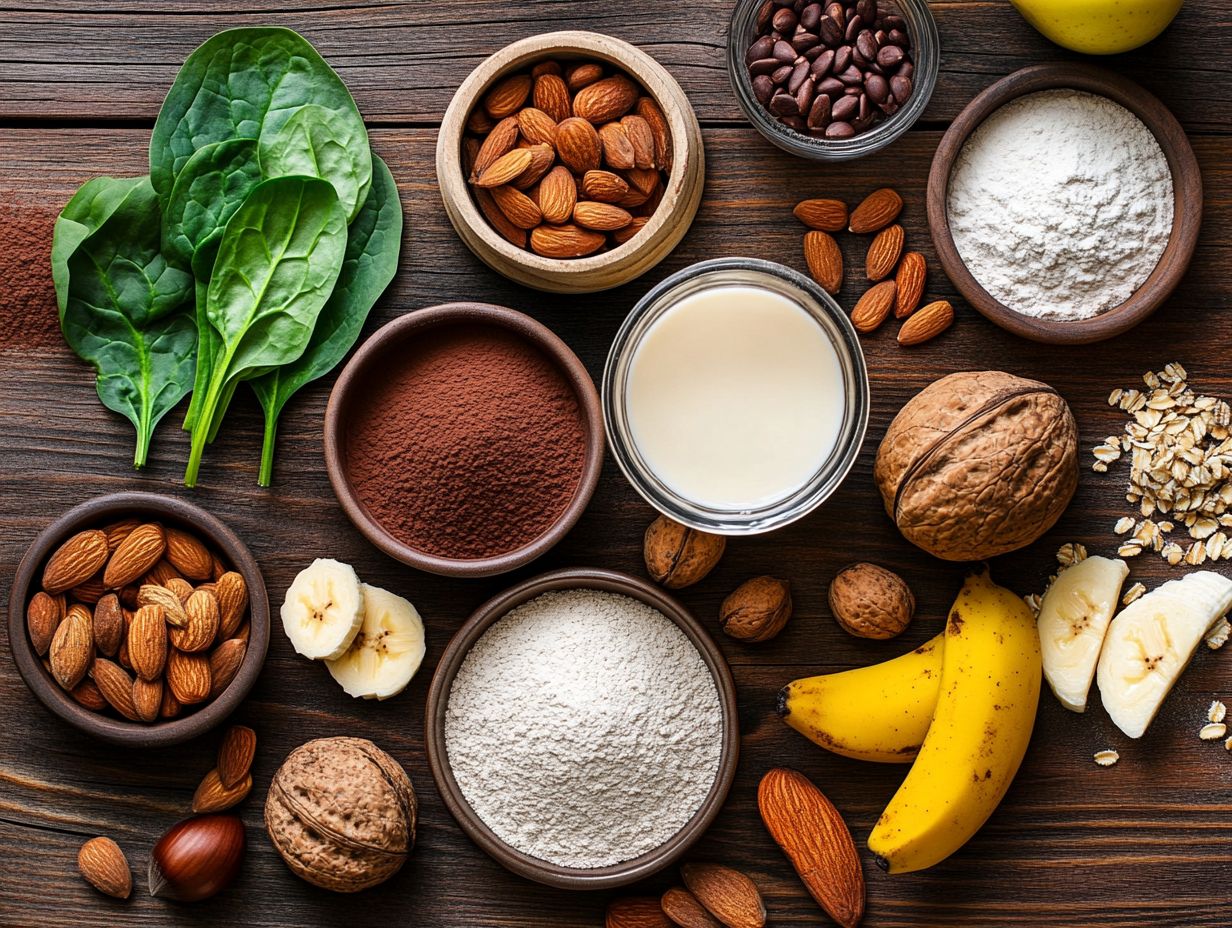
What are some common ingredients used in vegan cake recipes?
Some common ingredients used in vegan cakes include non-dairy milk, vegan butter or oil, applesauce or mashed bananas for moisture, and flax or chia eggs as a binder.
Can I substitute regular flour for a vegan flour in a cake recipe?
Yes, there are several vegan flour options such as almond flour, coconut flour, and oat flour that can be used as substitutes for regular flour in a cake recipe.
Are there any vegan alternatives to eggs in a cake recipe?
Yes, there are several vegan egg substitutes such as flax or chia eggs, silken tofu, and applesauce that can be used in place of eggs in a cake recipe.
What are some natural sweeteners that can be used in vegan cakes?
Some natural sweeteners that can be used in vegan cakes include maple syrup, agave nectar, and coconut sugar. These can be used instead of white or brown sugar.
Can I use plant-based milk in a cake recipe instead of regular milk?
Yes, plant-based milk such as almond, soy, or coconut milk can be used in place of regular milk in a vegan cake recipe. It may alter the taste and texture slightly, so it’s best to experiment to find the one you like best.
Are there any vegan alternatives to butter in a cake recipe?
Yes, there are several vegan butter alternatives available such as coconut oil, vegetable oil, and avocado. You can also use applesauce or mashed bananas for a lower-fat option.

